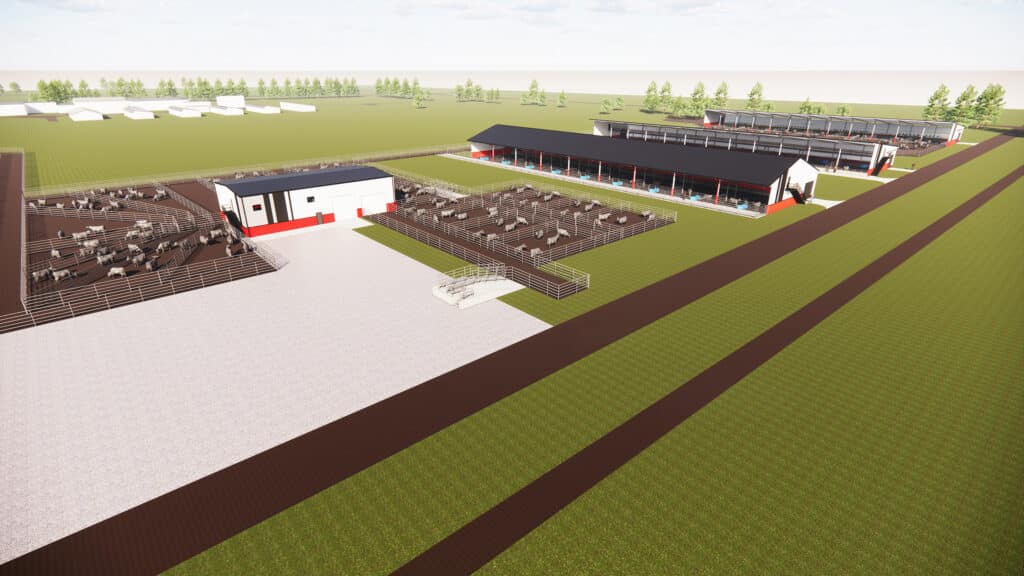Greater Omaha Packing gifts $700,000 towards UNL’s Feedlot Innovation Center
The University of Nebraska‒Lincoln will officially mark construction of the Feedlot Innovation Center at the Eastern Nebraska Research, Extension and Education Center near Mead during a groundbreaking ceremony at 11 a.m. Nov. 4.
In concurrence with the groundbreaking, Greater Omaha Packing Co., a supplier of premium beef, has announced a $700,000 pledged gift to the University of Nebraska Foundation to support the construction of the state-of-the-art facility. In recognition of its philanthropic support, the university will name the new center’s animal handling and instructional classroom building for the company. The naming is pending approval by the University of Nebraska Board of Regents.
The center will provide new capacity to develop and evaluate emerging technology used in managing animals in feedlot settings. Featuring the latest innovations, a commercial-scale feedlot and an animal handling facility will be used in teaching, research and extension efforts by the Institute of Agriculture and Natural Resources.
The project was approved by the Board of Regents on June 23. With an estimated cost of $7.5 million, it is being funded through a combination of private giving, grants and IANR program funds.
Henry Davis, CEO of Greater Omaha Packing Co., said its support of the Feedlot Innovation Center symbolizes the company’s 100-plus-year commitment to the continuous improvement of the American cattle industry and the communities in which it operates. It also reflects the long-standing relationship between Greater Omaha Packing and the University of Nebraska‒Lincoln.
“We all have a stake in the long-term success of the beef industry,” Davis said. “In partnership with the University of Nebraska and other contributors, Greater Omaha Packing is confident that our support of the Feedlot Innovation Center will lead to groundbreaking research, technology and insights that will help advance the industry, strengthen and expand the entire supply chain and ultimately drive value back to family farms.”
Mike Boehm, Harlan Vice Chancellor for IANR and University of Nebraska vice president for agriculture and natural resources, said the center will offer many opportunities for collaboration.
“The Feedlot Innovation Center presents an incredible opportunity to bring together industry partners, cattle producers, and UNL researchers and students to advance sustainable beef production,” Boehm said. “IANR has a long-standing and productive partnership with Greater Omaha Packing, and we are thrilled with their support of this project and that of others and look forward to continued collaboration.”
Fundraising is ongoing for the project. Other lead contributors who have announced gifts for the center include John and Beth Klosterman, JBS USA and Farm Credit Services of America. For information about supporting the center, contact Marcia White at the University of Nebraska Foundation at 402-458-1249 or give online.
Pending approval by the NU Board of Regents, the center will be named the Klosterman Feedlot Innovation Center in recognition of the Klostermans, who are longtime supporters of the university and its ag programs.
The center will include a complex with cattle comfort and research buildings, a feed technology facility, innovative open lots and an animal handling facility that contains instructional classrooms. It will create real-world facilities to test new precision technology, solve environmental challenges facing the feeding industry, and improve cattle performance and welfare while comparing different environments and housing systems. The project will also allow for innovation in manure collection and management that will innovate both new and possible modifications for existing operations.
The center will allow students to gain hands-on experiences while being exposed to the newest research and technology and is a key component of the university’s Beef Innovation hub, which aims to advance, support and communicate continuous improvement of beef production, economic vitality and natural resources stewardship through innovative research, education and extension.
IANR strives to innovate new ways to produce food, fuel, feed and fiber for a growing world in a way that promotes resilience of natural resources and a high quality of life for people engaged in agriculture.


